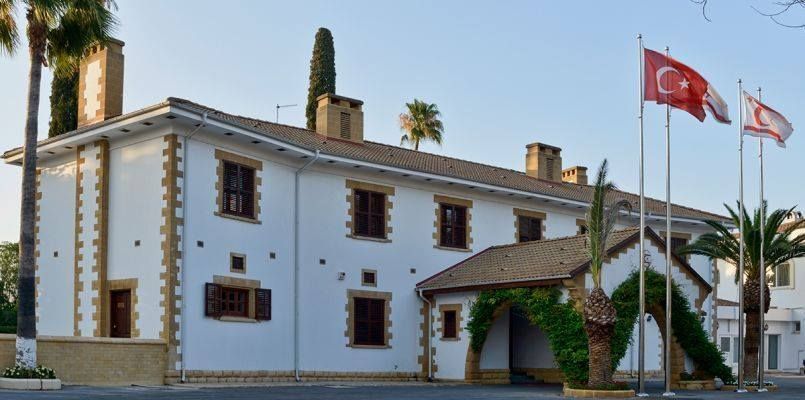Statement of the Presidency: “The Maraş initiative is aimed at protecting and establishing rights”

The closed part of Maraş (Varosha), which is within the territory of the Turkish Republic of Northern Cyprus, shall be freed from being held a hostage to the Cyprus problem, and will be integrated into civilian life. The transfer of closed part of Maraş to any other administration through other decisions is out of question.
The Council of Ministers has taken a decision determining the initial policy considering the opening of Maraş in 2019, and the ground work necessary for its implementation have been initiated. As it will be recalled, with the opening of some public areas to visits last October, the psychological propaganda tool of the Greek Cypriot side has been taken from them. Within the framework of this work, we have shared with both the public and all relevant parties that our basic principle is the protection of the rights of the claimants.
Following the opening of certain parts of the closed area for public use in accordance with the framework of the established policy, the first step in integrating into civilian life a section of the closed part of Maraş, which is located in one of the most beautiful places in our Gazimağusa region, has been taken, through the decree of the Council of Ministers granting civilian status to that section. There are 36 applications before the Immovable Property Commission that have been filed by former habitants in the area in question. The most important aspect of these applications is that the former habitants have already expressed their intention to invoke their rights concerning these immovable properties. With this decision, the Immovable Property Commission (IPC), which is recognised as an effective domestic mechanism by the European Court of Human Rights, will be able to offer the claimants all three legal remedies that are available, namely restitution, compensation or exchange, concerning the immovable properties located in the civilian area.
The Turkish Republic of Northern Cyprus is not after usurping anyone's rights, but is, on the contrary, pursuing a policy of enabling former inhabitants to have access to the existing legal mechanism which is able to provide an effective domestic remedy they have been waiting to benefit for so many years.
All parties, especially the Greek Cypriot leadership, who oppose our initiative to establish rights through an internationally recognised mechanism, should be aware that asking for a reversal of our decision amounts to rejecting the former inhabitants the right to have access to their rights. It is also clear that this simply means the preservation of the status quo.
The latest example of the statements made with the provocation and pressure of the Greek Cypriot side is the statement of Josep Borrell, Vice President of the European Union Commission and High Representative for Foreign Affairs and Security Policy. With his statement, Mr Borrell once again revealed that the EU does not have the ability to act in an objective manner on Cyprus and has become a part of the Cyprus problem itself. The regrettable statement has also shown that the EU is unable to put forward a constructive approach on issues related to Cyprus. It also shows that the EU's position on the island consists of a repetition of Greek Cypriot policy and discourse. For these reasons, these and similar statements of the EU, which constantly ignore the Turkish Cypriot side, are of no value.
A just and sustainable settlement in Cyprus can only be found through negotiation after the two sides agree on a common ground of their own free will. In this context, the equality of the two parties is of vital importance. The main element to ensure equality is the acknowledgement that both parties have sovereign equality and equal international status. The fact that the parties, who claim to support a solution in Cyprus, ignore the necessary equality and refer to a collapsed basis, undermining the ongoing consultations to determine whether or not there is common ground between the two sides, is harming this process itself. It also negatively affects the trust and possible prospects for cooperation between the two parties.
In the Cyprus issue, imposed models are not the way forward. The solution will only come with the mutual agreement of the two parties. All interested parties, including the EU, should adopt an approach that respects this principle and make their statements accordingly.
The Council of Ministers has taken a decision determining the initial policy considering the opening of Maraş in 2019, and the ground work necessary for its implementation have been initiated. As it will be recalled, with the opening of some public areas to visits last October, the psychological propaganda tool of the Greek Cypriot side has been taken from them. Within the framework of this work, we have shared with both the public and all relevant parties that our basic principle is the protection of the rights of the claimants.
Following the opening of certain parts of the closed area for public use in accordance with the framework of the established policy, the first step in integrating into civilian life a section of the closed part of Maraş, which is located in one of the most beautiful places in our Gazimağusa region, has been taken, through the decree of the Council of Ministers granting civilian status to that section. There are 36 applications before the Immovable Property Commission that have been filed by former habitants in the area in question. The most important aspect of these applications is that the former habitants have already expressed their intention to invoke their rights concerning these immovable properties. With this decision, the Immovable Property Commission (IPC), which is recognised as an effective domestic mechanism by the European Court of Human Rights, will be able to offer the claimants all three legal remedies that are available, namely restitution, compensation or exchange, concerning the immovable properties located in the civilian area.
The Turkish Republic of Northern Cyprus is not after usurping anyone's rights, but is, on the contrary, pursuing a policy of enabling former inhabitants to have access to the existing legal mechanism which is able to provide an effective domestic remedy they have been waiting to benefit for so many years.
All parties, especially the Greek Cypriot leadership, who oppose our initiative to establish rights through an internationally recognised mechanism, should be aware that asking for a reversal of our decision amounts to rejecting the former inhabitants the right to have access to their rights. It is also clear that this simply means the preservation of the status quo.
The latest example of the statements made with the provocation and pressure of the Greek Cypriot side is the statement of Josep Borrell, Vice President of the European Union Commission and High Representative for Foreign Affairs and Security Policy. With his statement, Mr Borrell once again revealed that the EU does not have the ability to act in an objective manner on Cyprus and has become a part of the Cyprus problem itself. The regrettable statement has also shown that the EU is unable to put forward a constructive approach on issues related to Cyprus. It also shows that the EU's position on the island consists of a repetition of Greek Cypriot policy and discourse. For these reasons, these and similar statements of the EU, which constantly ignore the Turkish Cypriot side, are of no value.
A just and sustainable settlement in Cyprus can only be found through negotiation after the two sides agree on a common ground of their own free will. In this context, the equality of the two parties is of vital importance. The main element to ensure equality is the acknowledgement that both parties have sovereign equality and equal international status. The fact that the parties, who claim to support a solution in Cyprus, ignore the necessary equality and refer to a collapsed basis, undermining the ongoing consultations to determine whether or not there is common ground between the two sides, is harming this process itself. It also negatively affects the trust and possible prospects for cooperation between the two parties.
In the Cyprus issue, imposed models are not the way forward. The solution will only come with the mutual agreement of the two parties. All interested parties, including the EU, should adopt an approach that respects this principle and make their statements accordingly.

